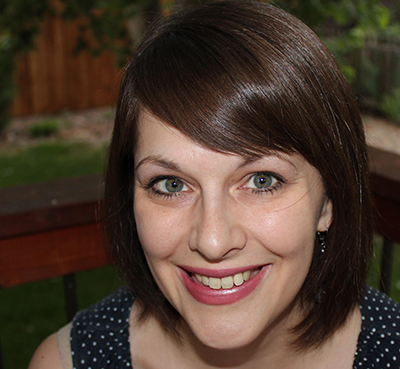by Meghan Johnston Aelabouni
My six-year-old daughter Natalie is like a lot of first graders: equal parts serious and silly, old and young. She often comes home from school full of newfound wisdom to share, as though she were the first person ever to discover subtraction or photosynthesis. . . and she still plays with toys and climbs into my lap, a taller version of the toddler she used to be.
As I watch Natalie learning new skills and independence, I pray fervently that she will also learn to be comfortable and confident in her body, mind and heart. And so, when I chided her the other day for making a mess in the kitchen, I was astonished to hear her mutter, “I hate myself! Stupid Natalie.” My beloved child’s self-disgust was like a knife in my heart. I told Natalie firmly that everyone makes mistakes, that she is loved no matter what, and that she is NOT stupid and does not deserve words of hate. I reminded her that when Jesus said to love our neighbors as ourselves, he meant for us to be kind and forgiving not only to others but also to ourselves — and even grownups find this difficult, I admitted. Natalie nodded knowingly: “Like that time I heard you crying and saying you were stupid,” she said.
I knew what she was talking about. A few weeks before, I had taken a major exam for my PhD program, and there was a delay in the results. Stressed and exhausted after ten weeks of studying and four days of exams, I told my husband tearfully that I was certain I had failed. I had worked so hard; and if the results weren’t good enough, clearly I wasn’t smart enough to get a PhD. My husband, no stranger to my bouts of insecurity, patiently reassured me; but from the basement, Natalie’s sharp ears heard it all.
Though I ended up passing the exam, now it seemed I had failed another kind of test: I’d been a bad parent. I had hoped to keep my kids free from the anxiety of perfectionism, with its agonizing fear of failure. I encouraged them to be brave, not perfect—to try things, to fall down and get up, to keep learning, not to give up. But my pep-talks had been undone by my own self-doubt, my own perfectionism rearing its ugly head. So, naturally, I started to berate myself: the other moms I know wouldn’t have been so thoughtless and wrapped up in themselves. Stupid. Then, a lightbulb suddenly clicked on in my mind; and a quiet voice said: See what you’re doing? This, right here, is the problem.
 We live in a world saturated with images and stories of people who seem perfect, or at least closer to it than we are. Brand-new moms with impossibly flat bellies. Successful CEOs who still have time to keep their homes magazine-perfect and throw Pinterest-worthy parties. Carefree world travelers whose entire lives seem Instagrammable. Christians who never seem to lose their faith. And, of course, parents who never lose their cool in front of their kids.
We live in a world saturated with images and stories of people who seem perfect, or at least closer to it than we are. Brand-new moms with impossibly flat bellies. Successful CEOs who still have time to keep their homes magazine-perfect and throw Pinterest-worthy parties. Carefree world travelers whose entire lives seem Instagrammable. Christians who never seem to lose their faith. And, of course, parents who never lose their cool in front of their kids.
One of my favorite writers, Glennon Doyle, says that we should be careful not to make the mistake of comparing our whole lives to someone else’s “highlight reel.”
No matter how perfect someone else’s life may seem, the reality is messier for everyone — no exceptions. The truth is that no one’s life is perfect, because perfection does not actually exist; and so our efforts at perfection are destined to fail, leaving us exhausted, defeated, and resentful of anyone who seems to have what we don’t.
“The perfect is the enemy of the good,” Voltaire wrote. No one knew that better than Martin Luther, who repeatedly tried and failed to be a perfect Christian and wound up resenting a God who would be so cruel as to expect perfection from people unable to reach it. Luther’s awakening to a fuller understanding of God’s grace meant freedom from perfection: freedom to let go of his need to be perfect and to see himself as fully known and fully loved by God. Beyond perfection, Luther found a life filled with purpose, joy and love for others — a good life. This is how God calls us, too: to a life beyond perfection, rooted in the goodness of God’s grace. God knows and loves us completely; and in rescuing us from the enemy, perfection, God invites us into something better: our calling to be more fully ourselves, and to extend compassion and love to others as they truly are.
As I tucked Natalie into bed that night, I spoke from my imperfect heart. “Here’s the thing,” I told her. “I was wrong to get frustrated with you, and I was wrong to say those things about myself. I forgot for a minute that God loves me, even though I’m not perfect and I make mistakes. And I want you to know that God loves you too, no matter what, and so do I. And even when you aren’t perfect and you make mistakes, I would never in a million years trade you for anyone else, because who you are is amazing.” Natalie nodded at me again, and smiled. “Don’t worry, Mom. It’s okay. You’re amazing too.”
And just like that, God met me with grace, through the mercy and wisdom of a child. May God meet you too, in surprising places, with grace beyond perfection.
Discussion questions:
1. If you could have a conversation with your younger self, what would you say?
2. What do you think God would say to you?
3. Where is God calling you beyond perfection?
Closing prayer:
Loving God, you created us and called us very good. Help us to trust in your love for us so that we let go of self-doubt, comparison, and despair. Guide us to find our true identity and purpose beyond perfection, in the goodness of your abundant grace. In Jesus’ name we pray, Amen.
 Meghan Johnston Aelabouni is an ordained ELCA pastor who is currently studying full time for a PhD in Religion, Media and Culture. Meghan and her spouse, the Rev. Gabi Aelabouni, live in Fort Collins, Colo. with their three young children.
Meghan Johnston Aelabouni is an ordained ELCA pastor who is currently studying full time for a PhD in Religion, Media and Culture. Meghan and her spouse, the Rev. Gabi Aelabouni, live in Fort Collins, Colo. with their three young children.
Photos by Calum Lewis and Luke Van Zyl on Unsplash. Used with permission.


Thank you for sharing this with us (me.) I have been trying to instill in my heart and mind that it is “the direction in our lives, not the perfection” that matters.
I love to see monthly devotions for our circles at church. thanks.
Great article, I find this with the group of ladies I work with. We should not compare ourselves to others and the way their perfect lives are portrayed in social media.
I think God forgives me for the times I lost patience with my little boys, but I remember–and have a feeling they remember, too. After all, I remember a spanking (with the yardstick) when I was intentionally screaming angrily and crying. So be it. My boys are middle aged now and I will be 80 next birthday. One is now facing surgery for a non-malignant brain tumor. The youngest has managed well with a serious mental illness since high school. There are no spouses or grand-children. They are supportive and caring of each other. We love and appreciate each other. God is blessing us, forgiving us, and patient with us. We are still “finding our true identity and purpose beyond perfection,” as Pastor Meghan suggests. Thank you, Jesus.
When I hear that verse of Jesus calling us to love our neighbors as ourselves, typically we focus on neighbors. But as you noted, Jesus is calling us to also love ourselves. I struggle daily with the need to be a perfect mom, wife, and employee. Reading hose words hit me and I will carry that thought with me. Jesus loves me and created me to be who I am. Thank you for that new perspective.